NHRC Foundation Day function: The Vice President of India, Mr. Jagdeep Dhankhar says, we must take sides when it comes to decimation of human rights; neutrality helps the oppressor, never the victim;.....
NHRC Foundation Day function: The Vice President of India, Mr. Jagdeep Dhankhar says, we must take sides when it comes to decimation of human rights; neutrality helps the oppressor, never the victim; also lauds the NHRC’s work including the Advisories for protection of human rights
NHRC Chairperson, Mr. Arun Mishra says, time has come for reservation within the reserved category to ensure fruits of development percolate down; also says, it is desirable to move in the direction of a Uniform Civil Code to ensure gender equality
New Delhi, 12th October, 2022
The National Human Rights Commission, NHRC, India, organized a function to celebrate its Foundation Day, at Dr. Ambedkar International Centre, New Delhi today on 12th October, 2022. The Commission was setup on this day in 1993. Addressing the gathering as the Chief Guest, the Vice President of India, Mr. Jagdeep Dhankhar said that serious challenges to human rights arise primarily on account of the silent and voiceless existence of the majority of our citizens, which in fact is a topic that needs to be brought into sharper focus in the public limelight. Human rights are quintessential for a flourishing democracy.
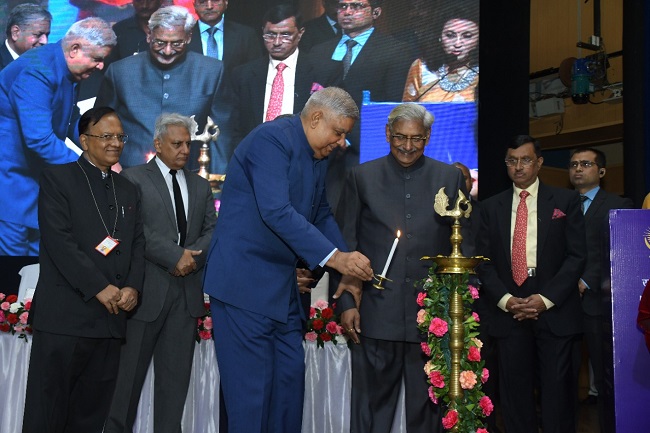
He said that human rights get compromised in the face of corruption. Poor and vulnerable are easy victims of this menace. Continual onslaughts on corruption are a bright sign in this direction and vulnerable sections are prime beneficiaries.
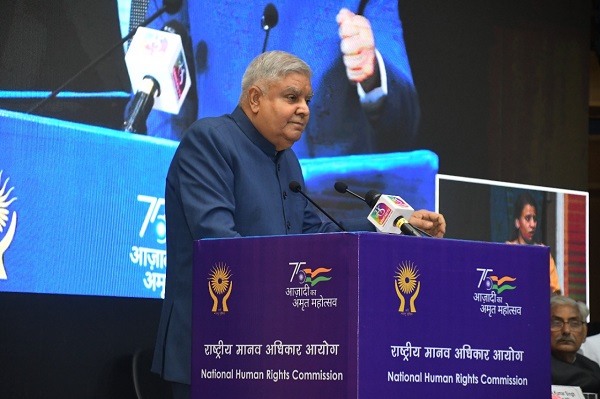
Appreciating the NHRC for propagating philosophy that human rights nurture and blossom in a regime where there is a rule of law and not the Law of the ruler, Mr. Dhankhar credited the Commission for its report on West Bengal Post-poll violence under a judicial fiat in shortest time underlining that the Law of the ruler not the rule of Law is the bane of human rights in the State.
The Vice President of India said that when it comes to decimation of human rights, we must take sides. Neutrality helps the oppressor, never the victim. Silence encourages the tormentor, never the tormented. In such a scenario, there is no option but to be pro-active and we must interfere.
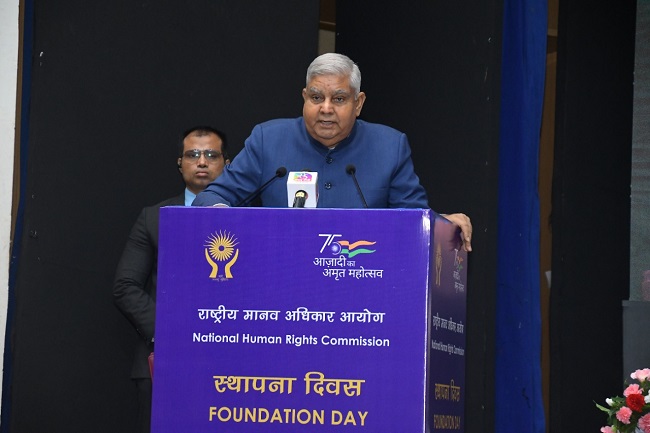
He said that India fortunately has a robust and strong mechanism of human rights regulations, both at the Centre and the State level. The Covid pandemic was a grave challenge to human rights on the planet. Countries laying claim to robust health infrastructure collapsed. In our country with a vision and strategy affording all health and food this menace was commendably contained. Getting “A” status of Accreditation by the NHRC, India from the Global Alliance of National Human Rights Institution, GANHRI, for the fourth consecutive term, is commendable as it also indicates our Nation’s excellent track record as regards Human Rights.
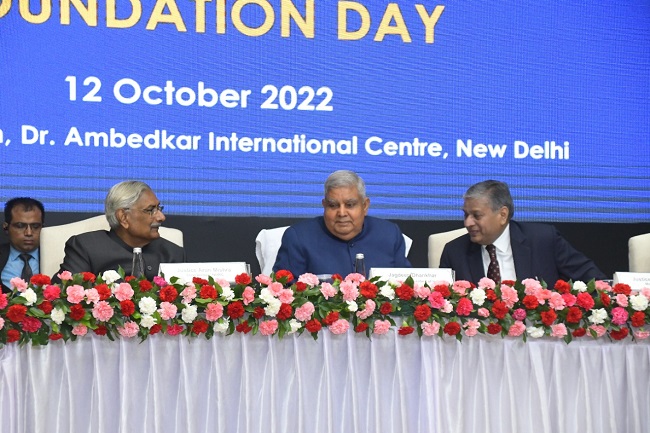
He also lauded the NHRC for its various Advisories and said that media should talk about them in high decibels to serve the cause of human rights. Protection of human rights is a shared responsibility of the society as a whole and not just of the Government or the NHRC. However, he said there is a strong need for the Commission to inspire and provide handholding support to the State Human Rights Commissions wherever it is required. He also urged every citizen to work for the protection and promotion of human rights.
Earlier, the NHRC Chairperson, Justice Mr. Arun Mishra said that we have to strike a balance between the distribution of benefits and distributive justice. More affirmative action is needed for the socio-economic and political upliftment of the marginalized sections of society. The time has come to clarify that unrepresented classes in services are provided reservation within the reserved category itself to ensure fruits of development percolate down.
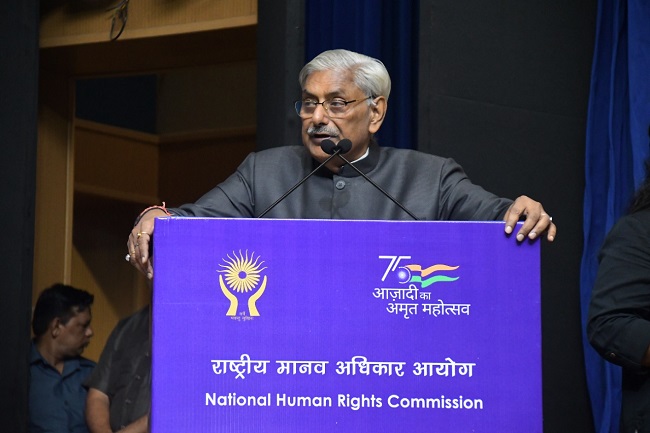
Justice Mishra said that we have to achieve gender equality and equal rights for all, in particular for women. They cannot be discriminated against and deprived of civil liberties and rights under the guise of dharma or customary practices. It is desirable to move in the direction of a Uniform Civil Code as envisaged in Article 44 of the Constitution of India. Without gender equality in all respect realization of human rights would remain a distant dream.
He said that the cyberspace has invaded human rights, including individual privacy, resulting in civil and human rights infringement. 96% of dark web of cyberspace has emerged as the most potent human and sex trafficking medium in the world. Trafficking of Women and Children, Tribals and Vulnerable Sections must stop.
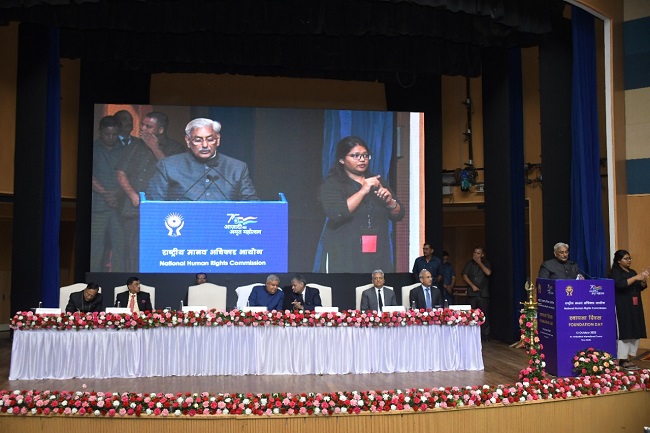
Emphasizing upon the need for the urgent prison reforms to get rid of crimes in the jails, the NHRC Chairperson said that the prisons are places to reform criminals, however, unfortunately, they have become places of crimes. He also said that the Local Self Governments are duty bound to implement statutory obligations towards public. Many of them are not even arranging garbage disposal and sewage treatment plants and do not care for manholes on roads. He also said that water quality in most rivers and streams does not meet the specified parameters and also not getting clean air in several cities in the country is a grave violation of human rights. Burning of stubble (Parali) in neighboring States must stop at once as it chokes Delhi every winter.
Justice Mishra also drew attention towards the global challenges of trans-border movement of hazardous waste, degradation of the environment, global warming and scarcity of potable water. He said that no country has the right to dump waste in other country.
He said due to technological advancements, new trends for violating human rights are being noticed. Cyberspace has invaded human rights, including individuals' privacy, resulting in the infringement of civil and human rights. Due to the advent of e-commerce, cross-border transactions take place. Cases of fraud in e-commerce, hacking data and demand for ransom in crypto- currency multiply the difficulty of identifying and tracking offenders.
Giving a brief inside into the Commission’s activities including visits to mental health hospital, Prisons and 20 Advisories on ensuring rights of vulnerable section of society, the NHRC Chairperson said that during the last year, more than 1.21 lakh complaints were received and more than 1.28 lakh including the old and fresh cases decided. The Commission recommended a monetary relief of approximately Rs. 100 million in 250 cases. By now, in 30 years, the Commission has recommended compensation of Rs. 2.3 Billion.
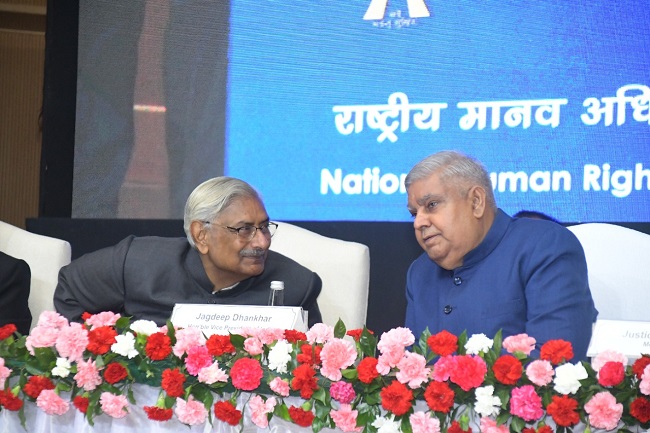
The NHRC Secretary General, Mr. Devendra Kumar Singh expressed his gratitude towards all those, who attended the function and extended support in seamlessly organizing it. He appreciated the role of media in spreading awareness about human rights and the reporting of human rights violations, which help the Commission to take suo motu cognizance of such incidents.
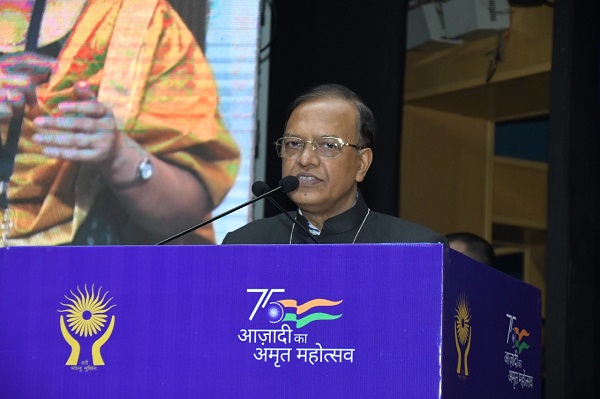
The NHRC Members Mr. Justice M.M Kumar, Dr. D.M. Mulay and Mr. Rajiv Jain, DG(I), Mr. Manoj Yadava, Chairperson and Members of State Human Rights Commissions, members of Judiciary, diplomats, senior government officers, civil society representatives, human rights defenders, among other dignitaries, attended the function, which was followed by a dialogue for Strengthening of Bonds With State Human Right Commissions and State Government/UT Administrations
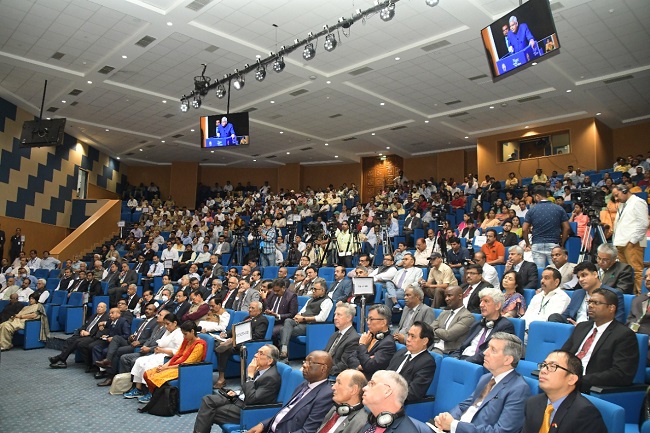
*****







 राष्ट्रीय मानव अधिकार आयोग, भारत
राष्ट्रीय मानव अधिकार आयोग, भारत

